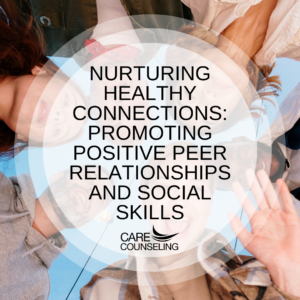Promoting Positive Peer Relationships and Social Skills
 In the intricate tapestry of a school environment, peer relationships play a pivotal role in shaping students’ experiences and well-being. School counselors, as navigators of students’ emotional development, have a unique opportunity to foster positive peer interactions and impart essential social skills. By equipping students with the tools to navigate friendships and collaborate effectively, counselors contribute not only to their immediate happiness but also to their lifelong success.
In the intricate tapestry of a school environment, peer relationships play a pivotal role in shaping students’ experiences and well-being. School counselors, as navigators of students’ emotional development, have a unique opportunity to foster positive peer interactions and impart essential social skills. By equipping students with the tools to navigate friendships and collaborate effectively, counselors contribute not only to their immediate happiness but also to their lifelong success.
Understanding the Significance of Positive Peer Relationships:
Positive peer relationships have far-reaching effects on students’ lives:
- Emotional Well-Being: Healthy friendships provide emotional support, reducing feelings of isolation and promoting a sense of belonging.
- Social Development: Interacting with peers hones social skills, helping students learn to communicate, empathize, and resolve conflicts.
- Academic Performance: Positive peer interactions can enhance the classroom experience, fostering an environment of collaboration and shared learning.
Strategies for School Counselors:
- Encourage Self-Awareness:
– Help students understand their own strengths and weaknesses. This self-awareness lays the foundation for healthy relationships.
– Guide them in identifying their emotions and expressing themselves effectively.
- Teach Active Listening:
– Instruct students on the art of active listening, which involves giving their full attention, understanding, and responding thoughtfully.
– This skill enhances empathy and deepens connections with peers.
- Foster Empathy:
– Engage in activities that help students see situations from others’ perspectives. This cultivates empathy and a better understanding of their peers’ feelings.
- Role-Play Social Scenarios:
– Create scenarios that mirror real-life social situations, encouraging students to practice communication, conflict resolution, and problem-solving.
- Address Bullying and Conflict Resolution:
– Offer workshops on identifying bullying behaviors and teaching students effective strategies for addressing and resolving conflicts.
- Emphasize Inclusivity:
– Encourage students to be inclusive and welcoming to all peers, regardless of differences. Discuss the importance of embracing diversity.
- Collaborate on Group Projects:
– Assign group projects that encourage collaboration and teamwork. Counsel students on effective group communication and respecting diverse viewpoints.
- Organize Social Skills Workshops:
– Host workshops that cover topics like making new friends, starting conversations, and building and maintaining relationships.
- Practice Digital Etiquette:
– Discuss online interactions and etiquette, emphasizing responsible and respectful behavior in digital spaces.
- Model Positive Behavior:
– School counselors can model the behavior they’re promoting by engaging in active listening, empathy, and respectful communication during their interactions with students.
- Develop Conflict Resolution Techniques:
– Teach students constructive ways to resolve conflicts, such as using “I” statements, finding common ground, and compromising.
- Utilize Peer Mediation Programs:
– Implement peer mediation programs where trained students act as mediators in conflicts, promoting peaceful resolution.
- Cultivate a Safe Space:
– Establish a safe and nonjudgmental environment where students feel comfortable discussing their social experiences and seeking guidance.
- Encourage Extracurricular Involvement:
– Participating in clubs, sports, or other extracurricular activities provides students with opportunities to connect and collaborate with peers who share similar interests.
- Celebrate Kindness and Positivity:
– Recognize and celebrate acts of kindness and positive interactions among students, fostering a culture of positivity and mutual support.
School counselors play a pivotal role in nurturing these relationships and equipping students with essential social skills. By providing guidance, fostering empathy, and facilitating opportunities for positive interaction, counselors create an environment where students can thrive emotionally, socially, and academically.



























